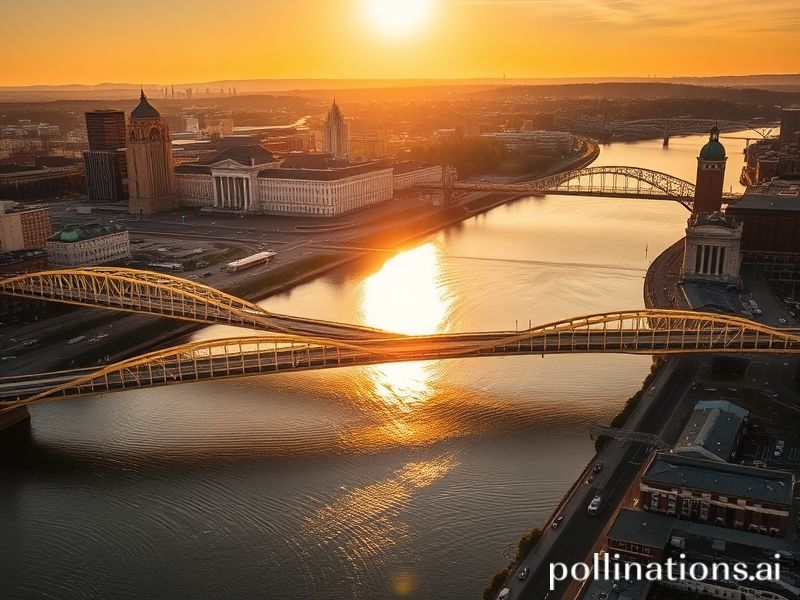Pittsburgh: The Post-Industrial Parable Every City Is Copy-Pasting
Pittsburgh: How a Rust-Belt Relic Became the Canary in Everyone’s Post-Industrial Coal Mine
By our Man in the Terminal Bar, filing under a bridge that has more Wi-Fi than Rio’s favelas
Somewhere on the flight from Singapore to Pittsburgh International—yes, they have one, and yes, it still calls itself “international” with the same charming optimism that North Korea calls itself democratic—the in-flight map flickers and reveals the secret geography of the twenty-first century: a glowing arc from Shenzhen’s factories, over the Arctic’s newly ice-free shipping lanes, to a sliver of river confluence where three modest streams once decided to pool their resources and pretend they amounted to something. The arc lands, the seat-belt sign dings, and the world’s investors collectively remember that Pittsburgh exists, much like a billionaire suddenly recalling a cousin who owns a lithium mine.
Because make no mistake: Pittsburgh is no longer the punch line in a Billy Joel song. It is the global parable of what happens after the smoke clears and the last pensioner stops expecting the mill to re-open. The city’s resurrection—equal parts Carnegie-Mellon patent portfolio, artisanal pierogi, and tax credits generous enough to make Ireland blush—has become the template for every mid-tier metropolis from Bilbao to Busan that woke up one morning to discover its heavy industry had emigrated to wherever labor is cheapest and environmental laws are more “aspirational.”
The implications ripple outward like cheap lager on a fraternity floor. When Google erects yet another glass box where a blast furnace once roared, venture capitalists in Berlin take notes on how to rebrand urban decay as “gritty authenticity.” When Uber tests self-driving cars on the same streets that once rattled with streetcars paid for in actual steel wages, policy wonks in Delhi scribble furiously about leapfrogging straight from human-driven poverty to algorithmic precarity. Even the Chinese delegation that flew in last month—straight from subsidizing coal plants in Pakistan—stood on Mount Washington at twilight, watched the skyline pretend it’s always been this clean, and quietly wondered how to file the intellectual property.
Meanwhile, the locals—those who didn’t flee to Charlotte—navigate the cognitive dissonance of being simultaneously the face of American decline and the poster child for its renaissance. They sip flat-whites in reclaimed brick warehouses where their grandfathers punched time clocks, and they vote for whichever populist promises to bring the jobs back without mentioning that the new jobs require a master’s in machine learning and a taste for quinoa. It’s as though someone staged The Deer Hunter as a start-up comedy, then hired Wes Anderson to direct the gentrification scenes.
Global capital, ever the respectful houseguest, has responded by pricing them out of their own neighborhoods. A three-bedroom row house that sold for the cost of a used Toyota in 1985 now commands the GDP of a Micronesian atoll. Somewhere in London, a hedge-fund algorithm just bundled mortgages on those same houses into a derivative named “Rust Belt Premium Alpha,” rated AAA because nothing says stability like betting on human nostalgia.
Yet the broader significance lies precisely in this contradiction. Pittsburgh demonstrates that you can indeed wash the soot off a city’s soul, provided you’re willing to swap one form of dependency—steel, coal, unions—for another: intellectual property, tax abatements, and the whims of the knowledge economy. It’s a cautionary tale dressed up as a TED Talk, and every post-industrial capital on the planet is currently binge-watching the series. Warsaw, Manchester, Wuhan—they all want the same trick, minus the part where half the population still remembers how to run a lathe and can’t find a use for that skill on GitHub.
So next time you see a glossy brochure boasting “the next Pittsburgh,” remember the city’s unofficial motto: “We rebuilt ourselves without asking whether we should.” Somewhere under the refurbished bridges, the ghosts of steelworkers nod grimly, because they’ve seen this movie before. Act One: prosperity. Act Two: collapse. Act Three: artisanal gin. Curtain falls, credits roll, and the audience checks their stock portfolios.
Welcome to Pittsburgh—population: everyone’s future, whether they like it or not. Bring an appetite for irony and a down payment. The water’s fine, as long as you can afford the filtration system.







